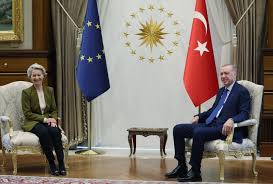Why is the EU turning to Turkiye now?

Dr Sinem Cengiz – Arab News
Brussels: The EU is facing increasing insecurity due to several factors that bring Turkiye’s role in European security to the forefront. Historically, Turkiye’s relations with the EU have been affected by both domestic and international shifts. Major developments at the international level, such as the end of the Cold War, or more recently, the Syrian crisis at the regional level, have affected the EU’s security and its relations with Turkiye.
Recently, on the sidelines of the Munich Security Conference, EU Commissioner for Enlargement Marta Kos met with Turkish Foreign Minister Hakan Fidan. Following the meeting, in a post on X, Kos said that “Turkiye is a candidate country and a strategic partner in southeast Europe, as well as the Eastern neighborhood.”
Every element of her statement carries significant weight. With Europe’s growing vulnerability, the EU has come to realize Turkiye’s strategic importance more than ever. It has been years since Brussels last emphasized the value of Ankara’s EU membership and Turkiye’s place in Europe. However, it was not surprising that European Commission President Ursula von der Leyen made one of her first foreign visits of her second term to Turkiye in December, where she met with President Recep Tayyip Erdogan.
Analysts following Turkish-EU relations highlight the rapprochement between the EU and Turkiye, and agree that progress toward Ankara’s membership is more likely than at any point in the past two decades.
The primary drivers behind this shift are the current geopolitical dynamics in Europe, particularly the war in Ukraine, and the Middle East, including the Gaza conflict and the situation in Syria. However, the most important factor is Washington’s approach toward Europe. These developments have left the EU with little choice but to develop a new approach toward Turkiye, a NATO member with the second-largest military force within the alliance.
The EU’s revised approach seems to be centered on a defense strategy that requires closer security cooperation with Turkiye. For Europe, Turkiye’s role has long been tied to its own security concerns, and Europe is now more dependent on Turkiye, militarily and politically, than ever.
Obviously, Turkiye is well aware of this situation and is likely to use the opportunity to advance its own interests.
The historical context of Turkiye’s relationship with Europe is important. On Sept. 9, 1979, during a conference in Istanbul, Bernard Lewis quoted Field Marshal Sir William Slim as saying: “Turkiye is the only European country in the Middle East (and) the only Middle Eastern country in Europe.” Turkiye remains a central player in the Middle East, Eastern Mediterranean, and Black Sea regions, where European and Russian interests often clash.
The EU has also clashed with Turkiye when it came to the Eastern Mediterranean, where there has now been a de-escalation mood, thanks to the improvement in Turkish-Greek relations. Some EU member states, such as Greece and France, have even vetoed Ukraine’s request to buy Turkish drones and artillery shells from Turkiye with EU funds.
Although Turkiye refrained from joining Western sanctions on Russia, it has consistently supported Ukraine’s security. For much of the past decade, some EU member states have viewed Turkiye more as a rival than a partner, and missed the opportunity to cooperate with Turkiye at a time when Russia continued bolstering its power at the expense of Europe.
For Europe, Russia continues to be the most immediate threat. Additionally, there is now a growing concern that Europe and the US may soon diverge on policy toward Russia and Ukraine. With growing skepticism about US foreign policy toward Russia, Europe feels an immediate need to bolster its defense capabilities, particularly on its southeastern flank. This skepticism is pushing the EU to consider integrating Turkiye into its security framework to strengthen collective defense and manage migration effectively.
However, Turkiye is not an “every-minute-ready” player to enter the EU’s game whenever needed. There must be an alignment of strategic interests by both sides and a careful navigation of the existing thorny issues between two sides if a new chapter is set to start. More importantly, Turkiye has had long-standing expectations from the EU in regard to its membership. In 1987, Turkiye took one of the most important and promising steps toward further integration when Ankara applied for EU membership.
Accession talks officially began in 2005, but the application has been repeatedly delayed. Thus, the decades-long process between Turkiye and the EU turned into a “never-promised membership.” The EU has failed to offer Turkiye a fair and realistic accession process. In response to the EU’s dubious approach, Turkiye has leveraged its position, using migration control and relations with Russia as bargaining tools. Meanwhile, the Turkish elite and public have also lost any enthusiasm about joining the EU.
In recalling the history of Turkish-EU relations, one wonders whether the bloc’s new approach will be another failed attempt to advance Turkiye’s EU membership. Now, Turkiye’s position is stronger than ever, and this could be understood from Fidan’s statement that “EU could become a more influential power in the region with Turkiye’s participation, and this is a critical opportunity for Europe’s security.” Yes, this is an opportunity for the EU to reassess its policy toward Ankara’s membership and consider integrating the country into the EU security architecture. Thus, the EU cannot hope to deter Russia effectively, in the absence of US support, without closer cooperation with Ankara. However, EU member states must have an unified stance toward Turkiye and then expect Ankara to respond to their call for closer cooperation.





